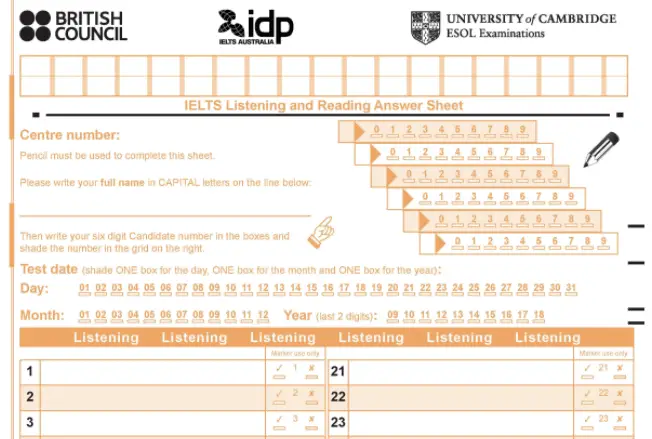IELTS Listening Question Types And Strategy
 There are six main types of questions that you will get in the IELTS listening test. Each one tests a slightly different sub-skill.
There are six main types of questions that you will get in the IELTS listening test. Each one tests a slightly different sub-skill.
This is done deliberately by the exam owners (The British Council, IDP and Cambridge) as the listening sub-skills relate directly to the situations you might face if you are going to work, travel and live in an English speaking country.
It is important that you are familiar with each style of question before the day of your test. If you are not you are likely to have to focus on working out 'how to answer the question' rather than focusing 100% on listening for the right answer to the question.
Once you have mastered and practiced the strategies that I am about to give you, you will be able to focus 100% on getting the right answer to the question. This can mean the difference between getting the band score you want and not doing so.
So, practice these strategies until they become 'second nature', that means until you follow the strategies without even thinking about it. Once you have reached this point you are in a position to maximise your band score with your current level of listening ability.
Fast Track To A Band 7+ With My Proven Course!
These strategies are simple step-by-step procedures that anyone can learn to follow. They have worked for thousands of candidates before you, so I am confident they will work well for you too! Here they are:
IELTS Listening Question Types and Strategy
More IELTS Listening Test Preparation Tips
Above, you have all of the different IELTS listening question types with a strategy to use to do them efficiently. A good idea is to do a full listening test and mark it yourself paying attention to which question types you get wrong.
It is possible that you find one particular type more difficult than the others. When you know which question types you are nots as good at you can focus your practice on that question type.
You might want to write/print out the technique that you need, or come up with your own technique that works well for you. Try doing the questions slowly and methodically without timing yourself so that you can learn and become confident in the new technique.
Gradually put yourself under time pressure until you are working fast enough for exam conditions.
Make sure that you use real/authentic IELTS practice materials so that you are practicing the specific question types that you need to.
Practice listening to speakers of different accents. IELTS will use speakers from Britain, America, Australia, New Zealand and Canada so make sure you practice listening to all of those accents (TED is a great place for finding those accents).
You also need to be aware of connected speech. This is when the sounds of one word lead into the next word so that words are said almost as one. For example, 'how are you?' is pronounced 'Howayou?'. It almost sounds like one word and if you are not aware of this then you will find listening to native speakers difficult.
The listening test is 30 minutes long and it is not in your first language. It is quite tiring to focus completely and listen in another language for that length of time. Therefore, make sure you listen to English for long periods of time as often as you can.
When you do listen to English if you are not doing a practice test then make sure you are being 'active' in your listening. Just sitting in front of a television watching an English program is not really going to improve your English.
You need to be actively engaged in the process. At the very least you can try noting down key facts from what you are watching/listening to so that you make yourself focus, otherwise 'passive' practice will hardly help you improve at all and you will have wasted a lot of time.
Finally, it is important to realise that it may take some effort to follow the above tips and practice in this manner, but in the long run it will help you get the band score you need much more quickly. The choice is yours!
Free IELTS Listening Samples And Practice Tests
A full online version of the listening test from the British Council.
IELTS Writing Task 1 (Academic)
Discover how to describe all types of visual data that you may see in this part of the test.
Sshhhhh! Listen closely, here are some valuable tips, techniques and strategies for maximising your listening band score.
IELTS Writing Task 1 (General)
Discover how to write in the correct format and tone for this part of the test.
Learn 'what' to say and 'how' to say it in each part of the test to impress the examiner.







2 Comments
MrTim
May 19, 2019You might want to try my full band 7+ IELTS course here: https://ieltsspeedway.com/
Paulo Falcone
July 16, 2018Hello,
I need to practice to practice to IELTS tests